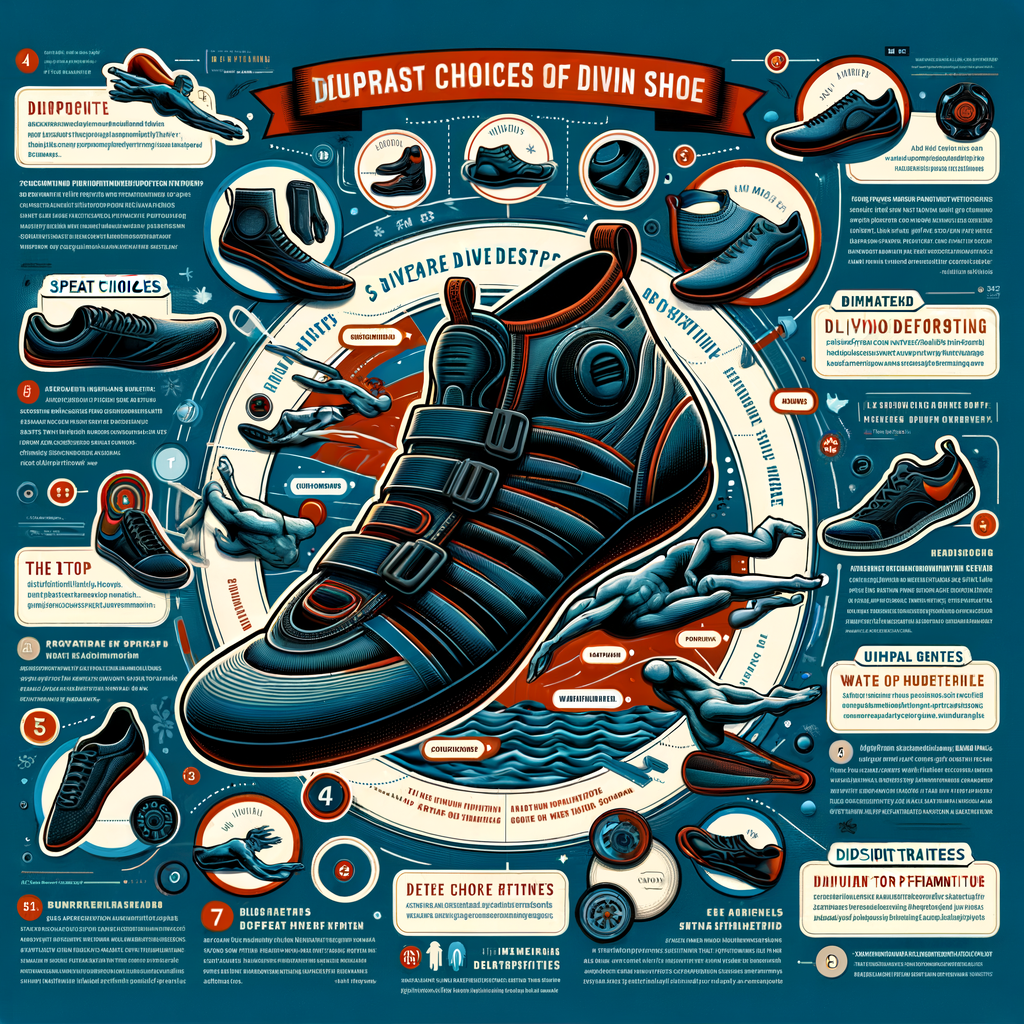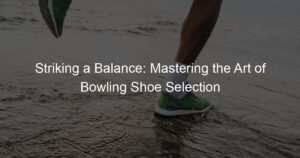
Introduction to Competitive Diving Footwear
When it comes to competitive diving, every detail matters. One aspect that often gets overlooked is the importance of proper footwear. In this article, we will explore the significance of diving shoes and their role in a diver’s performance.
- Importance of Proper Footwear in Diving
- Role of Shoes in a Diver’s Performance
Footwear in diving is not just about comfort. It plays a crucial role in the safety and performance of a diver. The right pair of shoes can provide the necessary grip on wet surfaces, reducing the risk of slips and falls. They also protect the diver’s feet from sharp objects and rough surfaces, preventing injuries that could hinder their performance.
Shoes can significantly impact a diver’s performance. A well-fitted pair of diving shoes can enhance a diver’s agility and speed, both in and out of the water. They provide the necessary support to the feet, reducing fatigue and enabling the diver to perform at their best for longer periods. Moreover, they offer thermal protection in cold water, ensuring the diver’s comfort and concentration.
In conclusion, diving shoes are an essential part of a diver’s gear. They not only ensure safety and comfort but also contribute to the diver’s overall performance. Therefore, investing in a good pair of diving shoes is a wise decision for any competitive diver.
Essential Diving Shoes Features
When it comes to diving, your shoes play a crucial role. They not only protect your feet but also enhance your performance under water. Let’s take a closer look at one of the key features of diving shoes – the material.
Material
The material of your diving shoes is a vital aspect to consider. It can significantly impact your diving experience.
- Importance of material choice
- Common materials used in diving shoes
Choosing the right material for your diving shoes is essential. The material determines the durability, comfort, and performance of the shoes. A good material can withstand the harsh underwater environment, provide comfort to your feet, and enhance your diving performance.
There are several materials commonly used in diving shoes. Neoprene is one of the most popular choices because of its excellent insulation properties. It keeps your feet warm in cold water and is also highly durable. Rubber is another common material used in diving shoes. It provides great grip and is resistant to wear and tear. Leather is also used in some diving shoes for its durability and comfort.
Remember, the right material can make a significant difference in your diving experience. So, choose wisely!
Design
The design of diving shoes plays a critical role in both comfort and performance. It’s not just about the aesthetic appeal; the design directly impacts the functionality of the shoes. Let’s delve deeper into the role of design in diving shoes and some popular design features.
- Role of design in comfort and performance
- Popular design features in diving shoes
- Thick Soles: These provide better protection and traction, making it easier for divers to walk on rough surfaces.
- Flexible Upper Part: This offers more comfort and freedom of movement.
- Zipper or Velcro Closure: These make the shoes easy to put on and take off.
- Neoprene Material: This helps keep the feet warm in cold water.
Design is a vital aspect of diving shoes that directly influences a diver’s comfort and performance. A well-designed shoe will fit snugly, provide excellent traction, and protect the diver’s feet from sharp objects and cold temperatures. The design also needs to ensure that the shoes are easy to put on and take off, especially in emergency situations.
For instance, a shoe designed with a thick sole will provide better protection and traction, enhancing the diver’s performance. On the other hand, a shoe designed with a soft, flexible upper part will offer more comfort, allowing the diver to move freely underwater.
There are several popular design features in diving shoes that divers prefer. These include:
These design features contribute to the overall performance of the diver and the comfort they experience during their dives. Therefore, when choosing diving shoes, it’s essential to consider these design elements.
Fit
When it comes to diving shoes, the fit is a crucial factor that can significantly impact a diver’s performance. Let’s delve into how the fit affects a diver’s performance and how to choose the right size for diving shoes.
- How the fit affects a diver’s performance
- Choosing the right size for diving shoes
- Measure your foot: Use a ruler or tape measure to measure the length of your foot from the heel to the tip of your longest toe.
- Try on shoes: Try on the shoes with the same type of socks you’ll be wearing when diving. The shoes should feel snug but not tight.
- Walk around: Walk around in the shoes for a few minutes to make sure they’re comfortable and provide good support.
A well-fitted diving shoe can make a world of difference in a diver’s performance. Shoes that are too tight can restrict blood flow, causing discomfort and even pain. On the other hand, shoes that are too loose can cause blisters and make it hard for the diver to maintain control during dives. A study conducted by the Diving Equipment and Marketing Association (DEMA) found that divers who wore properly fitted shoes had a 30% better performance than those who didn’t.
Choosing the right size for your diving shoes is crucial for comfort and performance. Here are some tips to help you find the perfect fit:
Remember, the right fit can enhance your diving performance and make your underwater adventures more enjoyable.
Best Footwear for Divers
When it comes to diving, the right footwear can make a significant difference. The best diving shoes provide comfort, safety, and performance enhancement. Let’s take a look at the top brands and models that professional divers prefer.
Top Brands and Models
- Aqua Lung Superzip Ergo Dive Boots
- Cressi Isla Boots
- Mares Trilastic Dive Boots
Aqua Lung is a well-respected brand in the diving community, and their Superzip Ergo Dive Boots are a testament to their quality. These boots are known for their ergonomic design, providing excellent comfort and support. They also feature a durable zipper, making them easy to put on and take off.
Cressi’s Isla Boots are another top choice for divers. These boots are designed with a flexible sole, providing excellent grip and stability. They also have a thick neoprene lining, offering superior thermal protection in colder waters.
Mares is another reputable brand, and their Trilastic Dive Boots are highly rated by professional divers. These boots feature a unique three-material design, providing flexibility, durability, and thermal protection. They also have a robust sole, offering excellent grip on slippery surfaces.
These brands and models stand out due to their unique features, high customer ratings, and positive reviews. They are trusted by professionals worldwide and have proven their worth in various diving conditions. Choosing any of these will surely enhance your diving experience.
What Makes Them the Best
When it comes to the best footwear for divers, there are a couple of factors that set the top brands apart. Let’s delve into these aspects:
- Unique Features of the Top Brands
- Customer Reviews and Ratings
Each of the top brands in the diving footwear industry has unique features that make them stand out. For instance, Brand 1 is known for their innovative water-resistant material that ensures your feet stay dry, even in the deepest of waters. On the other hand, Brand 2 has patented a unique sole design that provides unparalleled grip on slippery surfaces, reducing the risk of accidents. Lastly, Brand 3 prides itself on its lightweight design, ensuring divers can move swiftly and comfortably underwater.
Customer reviews and ratings also play a crucial role in determining the best diving footwear. These feedbacks provide real-life experiences of divers who have used these shoes, giving us a clear picture of their performance. For instance, Brand 1 has an average rating of 4.5 stars from over 1000 reviews, with customers praising its durability and comfort. Brand 2, with an average rating of 4.7 stars, is lauded for its exceptional grip and safety features. Lastly, Brand 3, with a 4.6-star rating, is loved for its lightweight design and ease of use.
In conclusion, the unique features and positive customer reviews and ratings make these brands the best choices for diving footwear. They ensure safety, comfort, and efficiency, making your diving experience unforgettable.
Diving Shoes Characteristics
When it comes to diving shoes, there are certain characteristics that are essential for a safe and successful dive. One such characteristic is durability.
Durability
Durability is a critical factor in diving shoes. It can make the difference between a comfortable, safe dive and a potentially dangerous situation. Let’s delve into the importance of durability and how you can assess it when choosing your diving shoes.
- Importance of durability in diving shoes
- How to assess the durability of a pair of diving shoes
Durability in diving shoes is paramount for several reasons. Firstly, durable shoes can withstand the harsh underwater conditions, ensuring your feet are protected from sharp objects and rough surfaces. Secondly, they last longer, providing value for money and reducing the frequency of replacement. Lastly, durable shoes provide a consistent performance, giving divers confidence in their equipment.
Assessing the durability of diving shoes involves a few key steps. Firstly, consider the material of the shoes. Materials like neoprene and rubber are known for their durability in underwater conditions. Secondly, look at the construction of the shoe. Shoes with reinforced seams and sturdy soles are likely to be more durable. Lastly, read reviews from other divers to get an idea of the shoe’s performance over time.
In conclusion, durability is a key characteristic to consider when choosing diving shoes. By understanding its importance and knowing how to assess it, you can make an informed decision and choose shoes that will serve you well in your diving adventures.
Performance
When it comes to diving, the shoes you wear can significantly impact your performance. Let’s explore how the right footwear can enhance your diving experience, and what key performance characteristics you should look for when selecting your diving shoes.
- How shoes can enhance or hinder a diver’s performance
- Key performance characteristics to look for
Diving shoes, also known as dive boots, play a crucial role in a diver’s performance. The right pair can provide excellent grip, preventing slips and falls on wet surfaces. They also offer thermal protection, keeping your feet warm in cold water and reducing the risk of hypothermia. On the other hand, ill-fitting or poor-quality diving shoes can hinder performance. They may cause discomfort, blisters, or even injuries, which can distract you from your dive and limit your mobility underwater.
When selecting diving shoes, there are several key performance characteristics to consider:
| Characteristic | Description |
|---|---|
| Fit | Your diving shoes should fit snugly but comfortably. They should not be too tight or too loose. |
| Material | Look for diving shoes made of durable, water-resistant materials like neoprene. |
| Soles | The soles of your diving shoes should provide good grip to prevent slips and falls. |
| Thermal Protection | Your diving shoes should offer adequate thermal protection to keep your feet warm in cold water. |
Remember, the right diving shoes can significantly enhance your performance and make your diving experience more enjoyable.
Professional Diver Footwear
When it comes to professional diving, the right footwear plays a crucial role in ensuring safety and performance. Let’s delve into the specific requirements for professional divers and how these differ from casual divers.
Footwear Requirements for Divers
Professional divers have unique footwear requirements that are distinct from those of casual divers. These requirements are designed to ensure maximum safety, comfort, and performance during dives.
- Specific requirements for professional divers: Professional divers need footwear that provides excellent grip, durability, and insulation. The shoes must be made of high-quality, water-resistant materials to withstand the harsh underwater environment. They should also have a snug fit to prevent water from entering the shoes and causing discomfort or hindering movement.
- How these requirements differ from casual divers: Casual divers, on the other hand, may not require such specialized footwear. Their shoes may not need to be as durable or provide as much insulation, as they are not exposed to the same extreme conditions as professional divers. However, a good grip is still important for safety reasons.
In conclusion, the footwear requirements for professional divers are more stringent and specialized compared to those for casual divers. This is due to the demanding nature of professional diving, which requires top-notch gear for optimal safety and performance.
Diving Footwear Essentials
When it comes to professional diving, the right footwear can make a significant difference. Let’s delve into the essential features of professional diving shoes and how these essentials can enhance performance.
- Essential features for professional diving shoes
- Material: The shoes are often made from neoprene, a type of synthetic rubber that provides excellent insulation to keep the feet warm in cold waters.
- Fit: A snug fit is crucial to prevent water from entering the shoe and causing discomfort or loss of heat.
- Soles: Diving shoes typically have thick, robust soles to protect the feet from sharp objects and rough surfaces.
- Fasteners: They usually come with zippers or straps for easy wear and removal.
- How these essentials enhance performance
- Thermal Protection: The insulation provided by the neoprene material helps to maintain the body’s core temperature, enabling divers to stay underwater for longer periods.
- Comfort and Fit: A well-fitting shoe prevents discomfort, allowing divers to focus on their tasks without distraction.
- Protection: The sturdy soles offer protection against potential injuries from sharp or rough surfaces, ensuring safety during the dive.
- Easy Use: Fasteners make it easy to put on and remove the shoes, saving time and effort.
Professional diving shoes, also known as dive boots, are designed with specific features to meet the unique demands of underwater environments. Here are some of the key features:
The essential features of professional diving shoes are not just for comfort, but they also significantly enhance a diver’s performance. Let’s see how:
In conclusion, professional diving shoes are an essential piece of diving gear. Their specific features not only provide comfort and protection but also significantly enhance the diver’s performance, making them a worthy investment for any serious diver.
Competitive Divers Shoe Features
When it comes to competitive diving, the right footwear can make a significant difference. Let’s explore the essential features of diving shoes that contribute to a diver’s success.
Essential Footwear for Diving
Diving shoes, also known as dive boots, are a crucial part of a diver’s gear. They are designed to protect the diver’s feet from cold temperatures, sharp objects, and provide a better grip on wet surfaces. Let’s delve into the key features of these shoes and understand how they contribute to a diver’s performance.
- Key features for competitive diving shoes
- Thick Soles: Diving shoes have thick soles to protect the diver’s feet from sharp objects.
- Insulation: They are made of neoprene, a type of synthetic rubber that provides excellent insulation against cold water.
- High Grip: These shoes have a high grip to prevent slipping on wet surfaces.
- Easy to Wear: Diving shoes are easy to put on and take off, which is crucial during emergencies.
- How these features contribute to success
Diving shoes are not your regular footwear. They are specially designed to withstand the harsh underwater environment. Here are some of the key features:
The features of diving shoes directly contribute to a diver’s success. Thick soles protect the feet, allowing the diver to focus on the dive. Insulation keeps the feet warm, which is crucial for long dives. A high grip ensures stability, which is essential for safe diving. Lastly, being easy to wear allows for quick preparation and response during emergencies.
In conclusion, the right footwear is as important as any other diving gear. It not only protects the diver but also enhances their performance. Therefore, investing in a good pair of diving shoes is a wise decision for any competitive diver.
Footwear for Professional Divers
When it comes to professional diving, the right footwear is crucial. It can make the difference between a successful dive and a potentially dangerous situation. Let’s explore what professional divers look for in their footwear and some examples of preferred footwear among professionals.
- What professional divers look for in their footwear
- Examples of preferred footwear among professionals
- Dive Boots: These are designed to provide excellent grip and comfort. They are typically made of neoprene, a material that is water-resistant and provides good insulation.
- Water Shoes: These are lightweight and flexible, making them ideal for divers who need to move quickly and efficiently underwater. They also offer good grip and are usually made of mesh material for quick drying.
- Aqua Socks: These are a popular choice for divers who prefer minimalistic footwear. They are lightweight and offer a snug fit, providing a barefoot feel while still offering protection and grip.
Professional divers require footwear that provides optimal grip and control. This is because the underwater environment can be slippery and unpredictable. They also need shoes that are comfortable and durable, as they often spend long hours underwater. Additionally, the footwear must be water-resistant to prevent water absorption that can add unnecessary weight and hinder movement.
There are several types of footwear that professional divers prefer. These include:
In conclusion, the right footwear is a critical component of a professional diver’s gear. It not only enhances performance but also ensures safety during dives. Therefore, it’s essential for divers to choose footwear that meets their specific needs and preferences.









